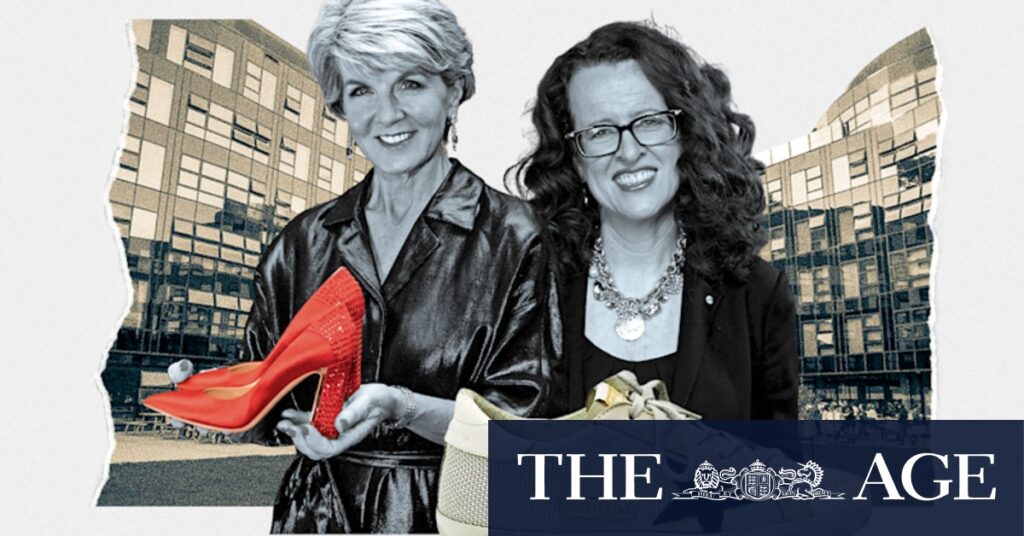
The Australian National University (ANU) is embroiled in a multifaceted crisis involving financial instability and cultural challenges, as the leadership of Vice Chancellor Genevieve Bell and Chancellor Julie Bishop comes under intense scrutiny. This situation has been exacerbated by revelations of Bell’s secondary employment with Intel and the university’s ongoing financial woes.
Bell, who was appointed as Vice Chancellor in September 2023, remained on Intel’s payroll until November 2024, a fact that took many in the academic sector by surprise. An executive from another major institution commented,
“It was a shocking look. Being a VC is a full-time gig.”
Despite the controversy, Bishop stated she approved the arrangement, although ANU’s council did not require disclosure of remuneration for such roles.
From Academia to Administration
Bell’s transition from a tech industry icon to a university leader was not without personal and professional challenges. Known for her distinct style, Bell was advised to alter her image upon taking the Vice Chancellor role. Her head of public affairs, Amy Capuano, noted on LinkedIn that Bell was advised to
“fix her wild red hair, to watch her weight, to swap her backpack for a briefcase.”
However, the greater challenge lay in addressing ANU’s financial crisis. The university had been operating at a deficit since the COVID-19 pandemic, with a reported operational deficit of $140 million in 2024. Bell and Bishop’s plan to cut $250 million from the budget, including $100 million in staff cuts, has sparked debate about the transparency and necessity of such measures.
Financial and Cultural Challenges
The financial instability at ANU is compounded by cultural issues. A report by former NSW assistant police commissioner Christine Nixon highlighted a
“deeply dysfunctional culture across the college and the broader university marked by bureaucracy, territorialism, bullying, entitlement and resistance to change.”
This environment poses a significant obstacle to creating a psychologically safe space for staff and students.
Higher education policy expert Andrew Norton commented on the situation, stating,
“You could argue that she inherited a situation that had been building for a number of years.”
He also questioned the council’s decision to appoint two Vice Chancellors without extensive prior university administration experience.
Leadership Under Fire
The scrutiny of ANU’s leadership extends beyond financial mismanagement. Allegations of inappropriate conduct by Bishop have surfaced, with Dr. Liz Allen, an ANU demographer, accusing Bishop of blocking her from leaving a room during a confrontation. Bishop has denied these allegations, maintaining that she always treats staff with respect.
The controversy has intensified discussions about the so-called “glass cliff,” a term used to describe precarious leadership positions often given to women. Bell has described the campaign against her as a manifestation of tall poppy syndrome, stating,
“Sexism is alive and well and living in Australia.”
However, this view is contested by some, including ANU professor John Blaxland, who urged support for Bell in overcoming the challenges she faces.
Future Prospects and Accountability
The Tertiary Education Quality and Standards Agency (TEQSA) is now investigating ANU’s governance and financial management. Dr. Mary Russell, TEQSA’s chief executive, expressed concern that ANU’s council may not have fulfilled its governance obligations. In response, ANU has acknowledged the difficulties and stated it has achieved significant savings.
As ANU navigates these turbulent times, the university’s leadership remains under pressure to demonstrate transparency and accountability. The coming months will be crucial in determining whether Bell and Bishop can steer ANU towards stability and regain the trust of the academic community.
In an interview with the Canberra Times, Bell expressed her commitment to her role, emphasizing her belief in the transformative power of work.
“I was raised to be really clear about why you do things,”
she said, underscoring her determination to make a difference at ANU despite the challenges.







